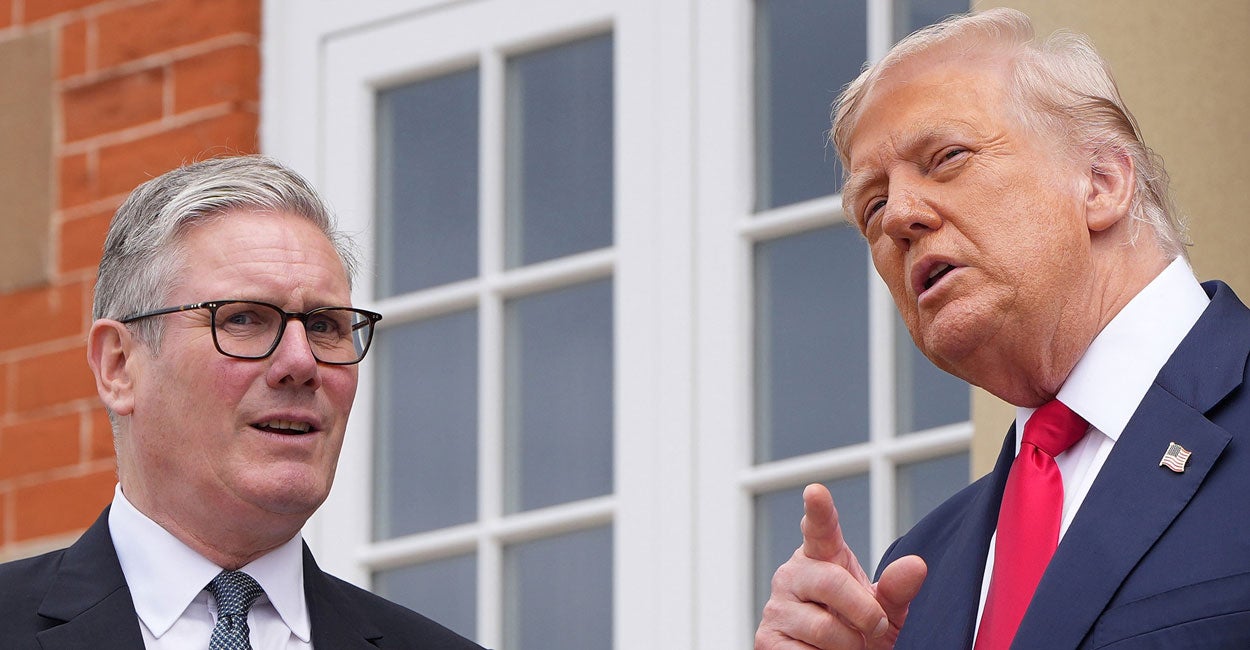


President Donald Trump could very well usher in a new birth of free speech in the United Kingdom, that very much appears to be on an Orwellian path to tyranny.
Despite a long, shared Anglo-American tradition of free speech, the U.S. and the U.K. are going separate ways. In the U.S., institutionally backed political correctness is on the wane, at least for now. In Britain, it’s being enforced by state authorities.
But with Trump set to make an unprecedented second state visit to the U.K. in late September, he has a chance to address one of the most contentious issues eroding our longstanding alliance.
“I will just say that in terms of, U.K., strange things are happening over there,” Trump said last Thursday. “They are cracking down and surprisingly so. And I’ve spoken to the prime minister and, let’s see what happens. But, it is a different, a little bit different situation. I’m very surprised to see what’s happening.”
What’s been happening there has been downright disturbing.
Britain’s speech crisis came to a head recently when British authorities arrested and interrogated Irish comedian Graham Linehan as he arrived in Heathrow Airport over a handful of social media posts. In the posts, Linehan had been critical of transgender ideology and mocked gender identity activists.
Even the reliably liberal Atlantic Magazine noted how disturbing and tyrannical this arrest was.
“Assuming that Linehan’s account is correct, then his arrest is totalitarian, absurd, and a waste of police time,” wrote Atlantic staff writer Helen Lewis. “It is also symptomatic of a wider chill on free speech in Europe, where the selective deployment of laws over hate speech, offense, and incitement has turned the police into the enforcers of progressive values and given them enormous discretionary power.”
In the U.K., not only does free speech not have the same legal protection as the U.S., but their system has made it easy to weaponize government and enforce what can only be described as woke blasphemy laws.
British authorities have attempted to extend those laws beyond their borders too. It’s noteworthy that Linehan had been in Arizona when he made the X posts leading to his arrest.
And the U.K.’s weaponization of censorship has undoubtedly escalated. The New York Post reported in August that about 30 people are arrested in the U.K. every day for social media posts and other speech crimes.
The “crimes” include everything from posting crass racialized words online to criticizing pro-Palestinian protesters to praying near an abortion clinic. Britain has not only criminalized rudeness, but it’s also actively suppressing political speech.
What the people of Britain and much of Europe are living through is if the Great Awokening in the U.S. never slowed down. Publicly condemning immigration laws, gender identity activists, or any of the Left’s sacred cows comes with the real risk of arrest.
But there are signs that at least some British subjects are fed up with the odious speech laws.
In recent months, the flag of England has been popping up all over public places as a sign of resistance to open ended immigration. It should be no surprise that the display of these flags is being criticized as “racist” by left-wing and legacy media news outlets. But suppressing speech while squashing serious questions about immigration and gender ideology is creating a powder keg in England that can’t simply be swept away.
The situation appears to have prompted Trump to action. Much like in his negotiations with other allies and adversaries, the 47th president seems willing to use American economic leverage to get the U.K. to abandon its censorship regime.
According to the Telegraph, Trump may demand stronger free speech guarantees by the British government in exchange for a technology sharing agreement. Not only will this benefit Brits, but American companies that risk running afoul absurd British laws.
“U.S. and U.K. officials have been working on a technology partnership that will include close co-operation on ‘pillars’ such as artificial intelligence and advanced computing,” the Telegraph reported. “Discussions about including a passage regarding the value of free speech in draft versions of a memorandum of understanding have been ongoing for several weeks.”
Less censorship in exchange for technological cooperation would certainly be a welcome development. It’s no exaggeration to note that if the U.K. doesn’t reverse course on censorship, it could do serious damage to the “special relationship” it’s had with the U.S. since the end of World War II.
Trump is giving the U.K. a serious amount of encouragement and a little cajoling to set things right. Maybe a little bit of the spirit of ’76 will finally hit England’s shores and help them save themselves from a fast-approaching dystopia.
